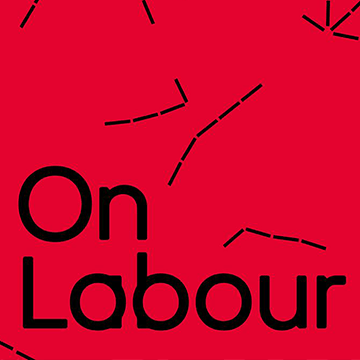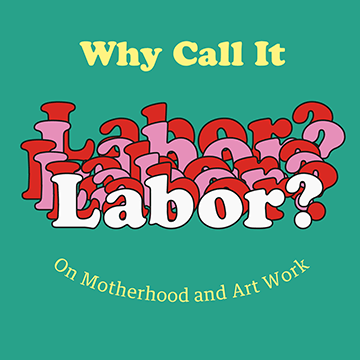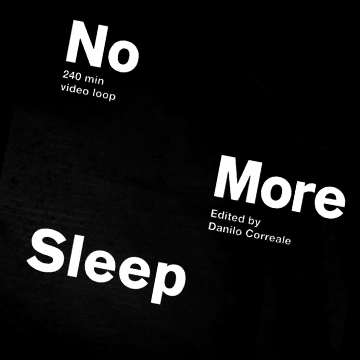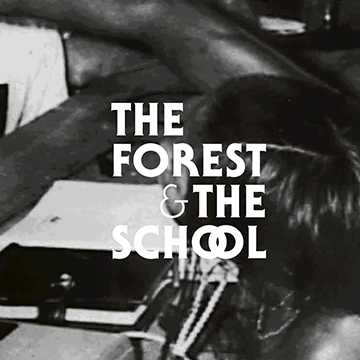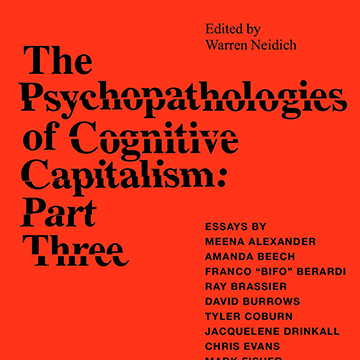Activist neuroaesthetics attempts to make the processes of digital dominion and governmentalization—which are becoming more and more prominent in late-stage cognitive capitalism (or neural capitalism)—opaque, visible, and known.
Tag: labour
Force Times Distance. On Labour
This reader is a culmination of direct and tangential deliberations on labour. Notions of labour appreciated across geographies and mediums. Newly commissioned textual manifestations in a multilogue with historical positions. The reader could be perceived as a negotiation of positions, as the strive towards utterances, towards becoming.
Why Call it Labor?
Why Call It Labor? comprises four essays and one conversation with contemporary artists and curators discussing their experience of becoming mothers as professionals in the arts, its reality and effects. While their reflections represent a similar strata of art worker in terms of background, class, and career trajectory, the impact of instruments of patriarchy on rendering maternity invisible that they describe is recognizable and insidious.
No More Sleep No More
Night-space and sleep, despite the recent media attention, remain rather uncharted territories in the landscape of human life, and continue to generate intriguing theories and propositions both in medical and social sciences. No More Sleep No More neither poses nor answers questions about sleep, but rather aims to reframe sleep and wakefulness into the framework of chronopolitics together with aspect of our lives absorbed under the neoliberal condition.
The Forest and The School / Where To Sit at the Dinner Table
Edited by the writer and visual artist Pedro Neves Marques, this book is a thorough anthology on Brazilian Antropofagia. It presents Antropofagia not simply as an aesthetic movement, based on acculturation or an hybridity exemplary of the tropics, but as a full scope South American cosmopolitics, defined by predation and the immanence of the enemy, by an humanity unbound from species, and a technology aimed at leisure.
Bitter Things
Labor migration is worldwide creating new models of the transnational family, which despite geographical distances strives to maintain contact between the separated family members. But, how is the relationship between parents and children to be redefined whenever gifts and material support take the place of shared experience? When physical closeness has to take second place to communication programs like Skype and WhatsApp? How does this changing family landscape impact children and their parents? Bitter Things retraces positions on this topic from the 1960s right up to present day perspectives.
The Psychopathologies of Cognitive Capitalism. Part Three
This third volume of The Psychopathologies of Cognitive Capitalism emerges from deliberations that took place during two different symposia. The first was a collaboration between Warren Neidich and Mark Fisher at the Department of Visual Culture at Goldsmiths College, titled The Psychopathologies of Cognitive Capitalism Part Three: The Cognitive Turn, and the second was an event organized in conjunction with the Goethe-Institut Los Angeles, Noise and the Possibility of a Future.
The Psychopathologies of Cognitive Capitalism. Part One
This book collects the papers that were presented at "The Psychopathologies of Cognitive Capitalism: Part One" conference in Los Angeles in November 2012. The conference brought together an international array of philosophers, critical theorists, media theorists, art historians, architects, and artists to discuss the state of the mind and the brain under the conditions of cognitive capitalism, in which they have become the new focus of laboring. How have emancipatory politics, art and architecture, and education been refined by semiocapitalism? What might be the lasting, material ramifications of semiocapitalism on the mind and brain?

